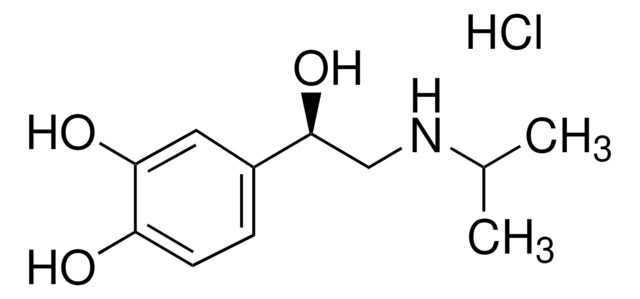P8688
(S)-(−)-Propranolol hydrochloride
≥98% (TLC), powder
Synonym(s):
(S)-1-Isopropylamino-3-(1-naphthyloxy)-2-propanol hydrochloride
About This Item
Recommended Products
Quality Level
Assay
≥98% (TLC)
form
powder
optical activity
[α]25/D −25.5°, c = 1.0 in ethanol(lit.)
mp
193-195 °C (lit.)
solubility
ethanol: 10 mg/mL
DMSO: <14.5 mg/mL
H2O: 50 mg/mL
45% (w/v) aq 2-hydroxypropyl-β-cyclodextrin: 8.0 mg/mL
originator
AstraZeneca
storage temp.
2-8°C
SMILES string
Cl[H].CC(C)NC[C@H](O)COc1cccc2ccccc12
InChI
1S/C16H21NO2.ClH/c1-12(2)17-10-14(18)11-19-16-9-5-7-13-6-3-4-8-15(13)16;/h3-9,12,14,17-18H,10-11H2,1-2H3;1H/t14-;/m0./s1
InChI key
ZMRUPTIKESYGQW-UQKRIMTDSA-N
Gene Information
human ... ADRB1(153) , ADRB2(154) , ADRB3(155) , HTR1A(3350) , HTR1B(3351) , HTR1D(3352) , HTR1E(3354) , HTR1F(3355)
Looking for similar products? Visit Product Comparison Guide
General description
Application
- as a non-selective β-blocker propranolol to inhibit the actions of epinephrine in mice
- as a β1- and β2-aadrenergic receptor blocker in rat
- as a medium supplement to investigate its effect on adipogenesis in hemangioma-derived stem cells (HemSC)
Biochem/physiol Actions
Features and Benefits
Signal Word
Warning
Hazard Statements
Precautionary Statements
Hazard Classifications
Acute Tox. 4 Dermal - Acute Tox. 4 Inhalation - Acute Tox. 4 Oral
Storage Class Code
11 - Combustible Solids
WGK
WGK 3
Flash Point(F)
Not applicable
Flash Point(C)
Not applicable
Personal Protective Equipment
Choose from one of the most recent versions:
Certificates of Analysis (COA)
Don't see the Right Version?
If you require a particular version, you can look up a specific certificate by the Lot or Batch number.
Already Own This Product?
Find documentation for the products that you have recently purchased in the Document Library.
Customers Also Viewed
Chromatograms
application for SFCapplication for HPLCapplication for HPLCOur team of scientists has experience in all areas of research including Life Science, Material Science, Chemical Synthesis, Chromatography, Analytical and many others.
Contact Technical Service







